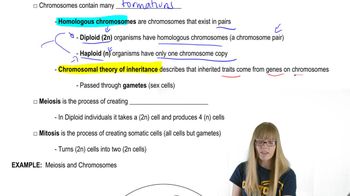It is common to study the biology and genetics of bacteria, yeast, fruit flies, and mice to understand biological and genetic processes in humans. Why do you think this is the case?
Table of contents
- 1. Introduction to Genetics51m
- 2. Mendel's Laws of Inheritance3h 37m
- 3. Extensions to Mendelian Inheritance2h 41m
- 4. Genetic Mapping and Linkage2h 28m
- 5. Genetics of Bacteria and Viruses1h 21m
- 6. Chromosomal Variation1h 48m
- 7. DNA and Chromosome Structure56m
- 8. DNA Replication1h 10m
- 9. Mitosis and Meiosis1h 34m
- 10. Transcription1h 0m
- 11. Translation58m
- 12. Gene Regulation in Prokaryotes1h 19m
- 13. Gene Regulation in Eukaryotes44m
- 14. Genetic Control of Development44m
- 15. Genomes and Genomics1h 50m
- 16. Transposable Elements47m
- 17. Mutation, Repair, and Recombination1h 6m
- 18. Molecular Genetic Tools19m
- 19. Cancer Genetics29m
- 20. Quantitative Genetics1h 26m
- 21. Population Genetics50m
- 22. Evolutionary Genetics29m
1. Introduction to Genetics
History of Genetics
Problem 3
Textbook Question
A commentator once described genetics as 'the queen of the biological sciences.' The statement was meant to imply that genetics is of overarching importance in the biological sciences. Do you agree with this statement? In what ways do you think the statement is accurate?
 Verified step by step guidance
Verified step by step guidance1
Understand the context of the statement: The commentator is emphasizing the central role of genetics in understanding biological processes. Begin by considering how genetics serves as a foundation for various biological disciplines.
Explore the role of genetics in heredity: Genetics explains how traits are passed from one generation to the next through the study of DNA, genes, and chromosomes. This foundational knowledge is critical for understanding inheritance patterns.
Discuss the importance of genetics in molecular biology: Genetics provides insights into the structure and function of DNA, RNA, and proteins, which are essential for understanding cellular processes and molecular mechanisms.
Examine the role of genetics in evolution and biodiversity: Genetics helps explain how genetic variation leads to evolution and the diversity of life forms, making it a cornerstone of evolutionary biology.
Highlight the practical applications of genetics: Genetics has significant implications in fields like medicine (e.g., genetic disorders, gene therapy), agriculture (e.g., genetically modified organisms), and biotechnology, showcasing its overarching importance in the biological sciences.
 Verified video answer for a similar problem:
Verified video answer for a similar problem:This video solution was recommended by our tutors as helpful for the problem above
Video duration:
1mPlay a video:
Was this helpful?
Key Concepts
Here are the essential concepts you must grasp in order to answer the question correctly.
Fundamentals of Genetics
Genetics is the study of heredity and variation in organisms, focusing on how traits are passed from one generation to the next through genes. Understanding the structure and function of DNA, the role of alleles, and the principles of inheritance is essential for grasping how genetic information influences biological processes.
Recommended video:
Guided course

Chromosomal Fundamentals
Molecular Biology
Molecular biology examines the molecular mechanisms that underlie genetic processes, including DNA replication, transcription, and translation. This field connects genetics with biochemistry and cell biology, highlighting how genetic information is expressed and regulated at the molecular level, which is crucial for understanding the complexity of life.
Recommended video:
Guided course

Mapping with Markers
Evolutionary Biology
Genetics plays a pivotal role in evolutionary biology by providing the mechanisms for variation and natural selection. The study of population genetics helps explain how genetic diversity contributes to the adaptation and evolution of species, reinforcing the idea that genetics is foundational to understanding biological diversity and the history of life on Earth.
Recommended video:
Guided course

Overview
Related Videos
Related Practice
Textbook Question
753
views


